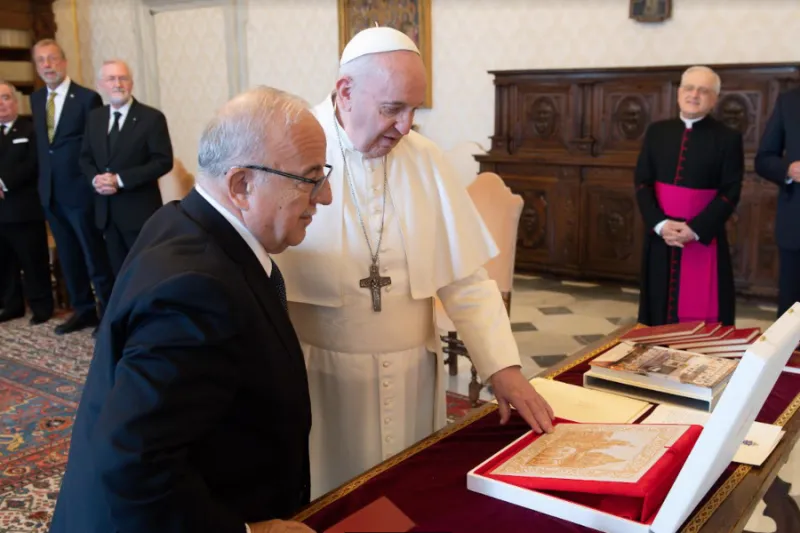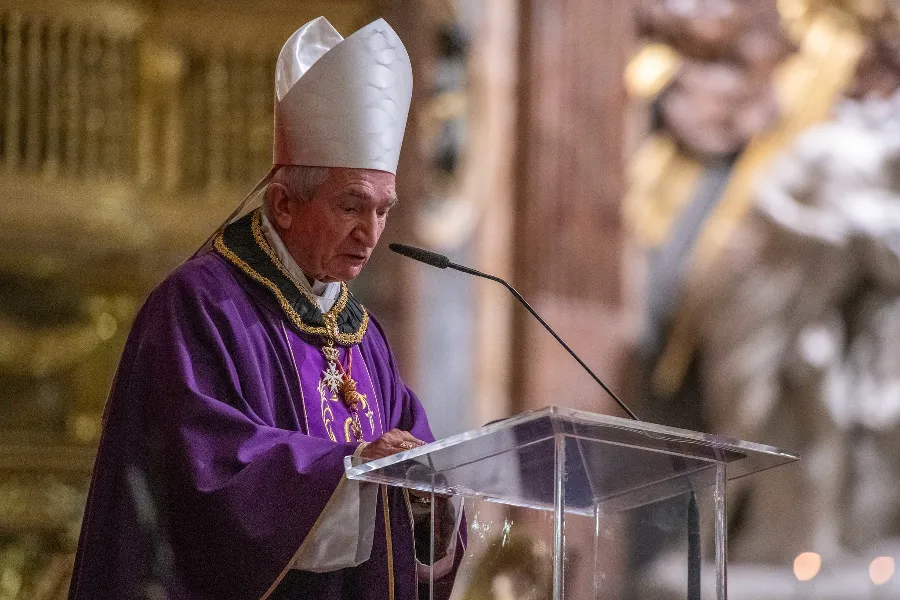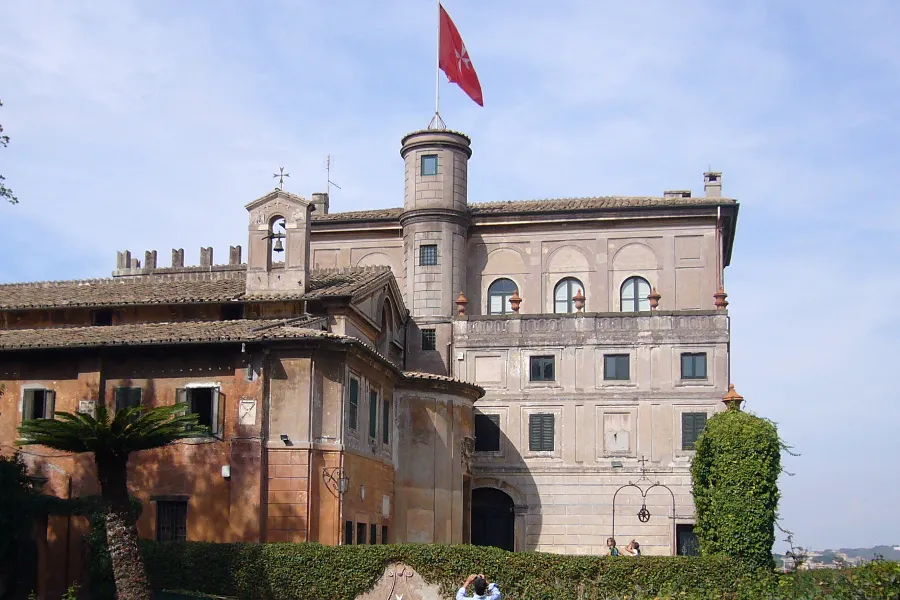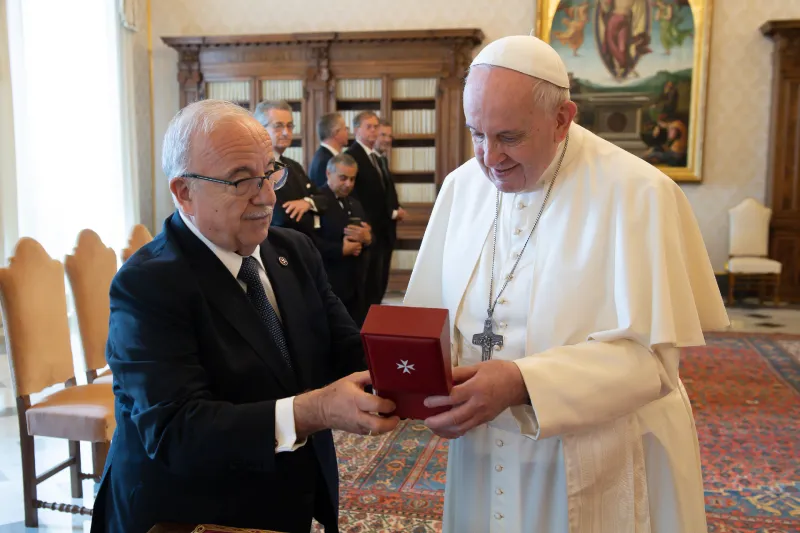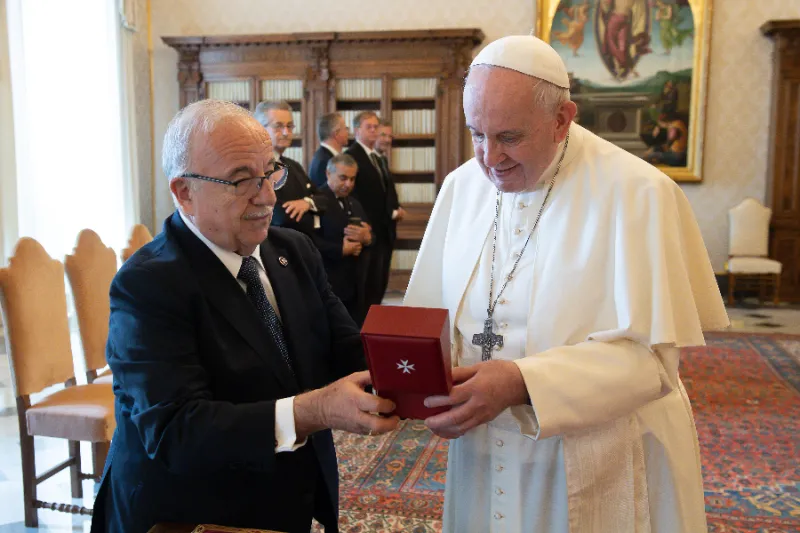 Pope Francis meets with the Order of Malta’s Fra’ Marco Luzzago on June 25, 2021. / Vatican Media
Pope Francis meets with the Order of Malta’s Fra’ Marco Luzzago on June 25, 2021. / Vatican Media
Rome Newsroom, Mar 31, 2022 / 04:42 am (CNA).
Pope Francis received two drafts of a new constitution for the Order of Malta at an audience with members of the 1,000-year-old institution on March 19. He reserved the right to read them calmly and then make his final decisions.
To understand what’s at stake, it’s essential to know how the order is structured. The organization’s members belong to three classes.
The First Class consists of the Knights of Justice, or professed knights, and Professed Conventual Chaplains, who take the religious vows of poverty, chastity, and obedience. They are defined as religious but not required to live in a community.
The Second Class is composed of Knights and Dames in Obedience, who promise to strive for Christian perfection in the spirit of the order.
The Third Class comprises lay members who neither take vows nor make promises but are committed to living a fully Catholic life according to the order’s principles.
Only First Class knights who descend from a family of four quarters of nobility are eligible to be elected as the Grand Master, the order’s religious superior and sovereign. This provision means that fewer than 40 people in the order can be considered for the position.
The Grand Master oversees the order with the help of a body called the Sovereign Council, whose members are elected for five-year terms by the order’s General Chapter.
Members of the Sovereign Council include the influential figure of the Grand Chancellor, who oversees the order’s 133 diplomatic missions, and the Grand Hospitaller, responsible for the order’s extensive humanitarian initiatives.
The order has three different types of national institutions spread around the world: six grand priories, six sub-priories, and 48 local associations.
The participants in the meeting with the pope on March 19 represented two sides in a years-long debate over reforms to the order’s constitution.
Some of those present were members of the group entrusted with drafting the new constitution, led by the papal delegate Cardinal Silvano Maria Tomasi. Also attending were representatives of the professed knights, the government of the order, the procurators of the priories, and the presidents of the associations, as well as the order’s current leader, Fra’ Marco Luzzago, who is known as the Lieutenant of the Grand Master.
The gathering enabled Pope Francis to hear the advocates of two contrasting visions for the order. First, that of the working group led by Tomasi, which stressed the need for the Order of Malta to be led above all by the professed. And second, that of the group set up by the Grand Chancellor Albrecht von Boeslager and entrusted to the leadership of Marwan Sehanaoui, president of the order’s Lebanese association, which called for a more collegial style of government.
The private papal audience lasted for two and a half hours instead of the expected hour and a half. According to participants who spoke with CNA, the pope said that he wanted to retain everything that makes the Order of Malta such an effective provider of humanitarian aid and he would review material provided by both sides before making a decision.
The two colliding visions have shaped the debate ever since Pope Francis launched the reform process in 2017 after he accepted the resignation of Grand Master Fra’ Matthew Festing in the middle of an internal governance crisis.
The debate over the new constitution became even more problematic following the death of Festing’s successor, Giacomo dalla Torre del Tempio di Sanguineto, in 2020.
Luzzago was then chosen to lead the order, not as Grand Master but as Lieutenant of the Grand Master, who typically serves a one-year term. But this term was extended by the pope himself, to an unlimited extent, amid the push to conclude the constitutional reform.
Pope Francis believes that the reform must, first of all, strengthen the Order of Malta as a religious institution and, secondly, reinforce its service to the poor. The draft presented by Tomasi’s working group should be read in this light.
The Tomasi-led group is composed of the canon law expert Father Gianfranco Ghirlanda, S.J., Msgr. Brian Ferme, the secretary of the Vatican’s Council for the Economy, and Maurizio Tagliaferri, Federico Marti, and Gualtiero Ventura.
Ghirlanda is understood to have spent about an hour explaining his position that the professed should lead the organization because it is at heart a lay religious order.
In practice, Ghirlanda derives authority from religious consecration. This, however, is only valid if the Order of Malta is considered primarily as a spiritual body. The situation is different if its governing bodies are considered “governing bodies” in the strict sense.
Ghirlanda was among the speakers at a recent press conference after the launch of Praedicate evangelium, the new Vatican constitution reforming the Roman Curia. At the press conference, he commented on the change allowing any baptized person, not only a bishop, to lead certain Vatican dicasteries. He said that this was possible because it was not ordination but receiving a canonical mission that gave dicastery heads their authority.
Ghirlanda said that this decision resolved the question posed by Canon 129 of the Code of Canon Law, according to which authority derives from priestly ordination. Ghirlanda noted that the decision had resulted from extensive debate.
But if the possibility for the laity to participate in government applies to the Roman Curia, why doesn’t it apply to the government of a body such as the Sovereign Order of Malta?
This is a much-debated topic that is at the heart of the reform proposals. Although the order’s sovereignty derives from a concession from the Holy See, it is constituted as a state without territory. With this international personality, it maintains diplomatic relations with other states and it is its sovereignty that allows it to continue working with the poor.
Many in the Order of Malta have stressed that a reform highlighting only the religious character, mainly submission to the Holy See, would dilute its sovereignty forever.
The importance of the order’s sovereignty was also raised by Luzzago in a speech to the diplomatic corps accredited to the order on Jan. 11 (although the text of the address can no longer be found on the order’s website.)
The pope’s affirmation that he wants to keep everything that allows the order to continue its work for the poor stems from this debate.
The vision of the group led by Sehnaoui, according to a source inside the order, is markedly different. It proposes that the General Chapter, the body bringing together representatives of all classes, would have 15 representatives of the professed knights. The associations would be represented not by assessing the number of works carried out but rather based on the budget allocated to these works. If the budget was less than $20 million, an association would be entitled to one delegate. If it exceeded $20 million, there would be a right to another representative, up to a total of four.
In this way, associations would see some of their concerns represented. Marc Odendall, a member of the first commission established by the pope to clarify the order’s internal problems in 2016, summed up this reasoning when he told CNA that “$2 billion turnovers, 45,000 employees, 100,000 volunteers in the world cannot be managed by 19 professed who are under 70 and have no professional qualifications.”
Sehnaoui’s draft reflects this concern, trying to find a balance between the need to maintain the order’s religious character and having a government more independent from the Holy See that also considers the professional work of many associations.
It remains to be seen which of the two world views will prevail. Now, everything is firmly in the pope’s hands. At the same time, the role of the papal delegate, Cardinal Tomasi, seems to be increasingly marginal.
[…]




